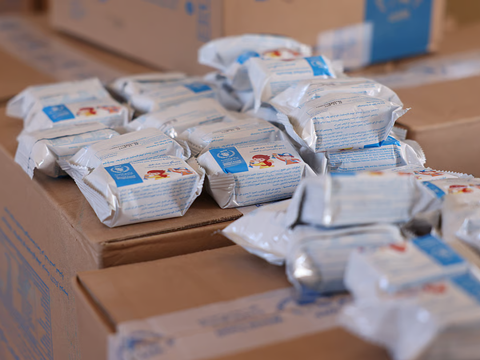
Having extended its partnership with the UN World Food Programme (WFP), Mondi plans to drive a transition into fibre-based packaging materials and address packaging-related food loss while feeding people in crisis.
WFP is a humanitarian organization providing food assistance in the wake of human conflict, natural disasters, and the impact of climate change. So far, Mondi has sought to overcome challenging transport, storage, and handling conditions in affected regions by improving and optimizing packaging designs.
Now it has extended the partnership by three more years, it plans to keep tackling packaging-related food losses across WFP operations. With 733 million people currently facing hunger, up to 1.9 million thought to be close to famine, and one-fifth of food produced for human consumption thought to be wasted every year, improved packaging is hoped to ensure that vital food supplies reach those in need.
Mondi also plans to help WFP food manufacturers adopt both virgin and recycled fibre-based packaging in pursuit of more sustainable materials; it will also work to optimize material use and bolster packaging quality in general.
Andrew King, group CEO at Mondi, commented: “Our partnership with WFP reflects Mondi’s purpose of contributing to a better world through innovative and sustainable packaging and paper solutions. Leveraging WFP’s exceptional humanitarian reach and expertise, we’re promoting long-term resilience in emergency food supply chains, while supporting the transition towards a circular economy.”
“We are proud and excited to enter the next phase of this impactful partnership with Mondi,” added Virginia Villar Arribas, deputy director of Private Sector Partnerships at WFP. “At a time of shrinking humanitarian resources, Mondi is stepping up to help WFP fight hunger with valuable funding and sector-leading expertise.
“Global partnerships like this one have never been more critical – thank you, Mondi.”
Last year, our very own Frances Butler discussed the challenges faced in food availability crises – for example, how low-income countries sometimes lack adequate processing and packaging solutions to keep up with widespread disaster – and explores the potential solutions, which include smaller portions per pack and considering both production and consumption in the pack’s design.
Aran has since unveiled a packaging solution to capture biogas from the fermentation of agricultural waste; this can then be delivered to households with limited access to traditional energy sources, helping them become self-sufficient in cooking, heating, lighting, and other daily activities. At the same time, this is hoped to promote renewable energy as a resource and bolster circularity.
If you liked this story, you might also enjoy:
Reuse vs. single use – which is better for the environment?
Sustainable Innovation Report 2025: Current trends and future priorities
What can the world learn from South Korea’s world-leading performance in plastics circularity?














No comments yet